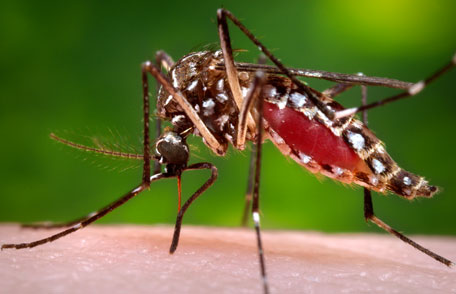Kat KelleyGHTC
Kat Kelly is a senior program assistant at GHTC who supports GHTC's communications and member engagement activities.

Vaccines
The US National Institutes of Health (NIH) is ramping up research for a vaccine against Zika, a mosquito-borne virus which is “spreading explosively” throughout the Americas and can cause birth defects, including microcephaly, which is associated with stunted head and brain development in newborns. The NIH will be offering new funding for Zika research and supplementary funding will be available for researchers studying similar viruses, including West Nile, dengue, and yellow fever. The NIH plans to initiate clinical trials of a Zika vaccine by the end of this year, and currently has two potential candidates, one resulting from research into West Nile virus. The Brazilian government is also supporting Zika vaccine research and development (R&D), but despite its commitment to developing a vaccine “in record time,” the process will take at least three to five years. GlaxoSmithKline is conducting feasibility studies to determine if its existing vaccine technology could be used to develop a Zika vaccine, however, the company warns it could take ten to fifteen years. Inovio Pharmaceuticals and GeneOne Life Science are initiating research to develop and test a DNA-based Zika vaccine, building on their current partnership for Ebola and MERS vaccine R&D.
Treatment
There are currently no available therapies for Zika disease and the US Centers for Disease Control advises treating the symptoms by resting, hydrating, and taking medicines for the fever and pain. The National Institute of Allergy and Infectious Diseases (NIAID) at NIH is testing Zika drug candidates. In light of the paucity of treatment options, NIAID Director Dr. Anthony Fauci is calling for a shift in the drug development “one-bug–one-drug approach,” noting that recent pandemics have demonstrated the need for antivirals effective against entire classes of viruses.
Diagnostics
Point-of-care diagnostics are “the first line of defense in these outbreaks,” according to FIND Chairman Mark Kessel, as rapid, accurate diagnosis is needed to “identify, treat and track the outbreaks to minimize the deaths and costs to the world economy.”
Currently, the standard approach for diagnosing Zika takes place in laboratory settings, and involves looking for the virus’ RNA in a blood sample, however the RNA only remains in the blood for a short period of time, and by the time the symptoms begin (3 to 12 days after infection), it may be too late. As exposure to Zika virus during pregnancy can lead to birth defects, scientists are also interested in diagnostic approaches that can test for past infections in newborns, however the leading method requires access to the live virus and advanced safety conditions not found in most labs.
When testing for antibodies against the virus in blood samples, differentiating between related viruses can be difficult, and Zika is primarily found in areas in which the related dengue virus is endemic. Despite these limitations, several diagnostics that test for antibodies against Zika are already on the market. Most notably, the Canadian diagnostic company Biocan launched a rapid Zika test in December that takes just ten minutes, and uses a finger prick to collect blood, making it safe for use in the field. Biocan is also launching the Tell Me Fast Dengue/Chikungunya/Zika Virus Combo Rapid Test, which as the name suggests, can detect dengue, chikungunya, or Zika virus.
Researchers at the University of Texas are developing a “cheap, portable box” that detects Zika virus DNA. The team has developed a prototype and is seeking additional funding for continued development and testing. The box structure enables testing of mosquitos for Zika virus, and could allow scientists to detect an outbreak early, rather than relying on reported cases in humans.
Vector Control
Without approved vaccines or drugs, and limited point-of-care diagnostic options for Zika virus, public health officials are calling for heightened mosquito control efforts. British biotechnology company Oxitec is testing genetically modified mosquitos to reduce the population of the Aedes aegypti mosquitos which transmits Zika, as well as dengue and chikungunya. Oxitec’s mosquitos are engineered to produce larvae that are unable to mature to adulthood, and in an ongoing trial in Piraciaba, Brazil, the introduction of the engineered mosquitos has resulted in an 82 percent decrease in A. aegypti larvae in just nine months. In response to the Zika outbreak, Oxitec is expanding its trial and building a new facility to produce the mosquitos. Oxitec is currently seeking approval from the US Food and Drug Administration to conduct additional trials in the Florida Keys.
The US government is taking the spread of Zika seriously, and President Barack Obama has called for research into Zika vaccines, drugs, and diagnostics. However, the White House is also emphasizing that the threat from Zika is distinct from that of Ebola. While the risk to women who are or may become pregnant is significant, for others, “the impact of the virus is relatively mild."
Are there additional Zika R&D initiatives that we’ve missed? Please send tips to Kat Kelley (kkelley@ghtcoalition.org).